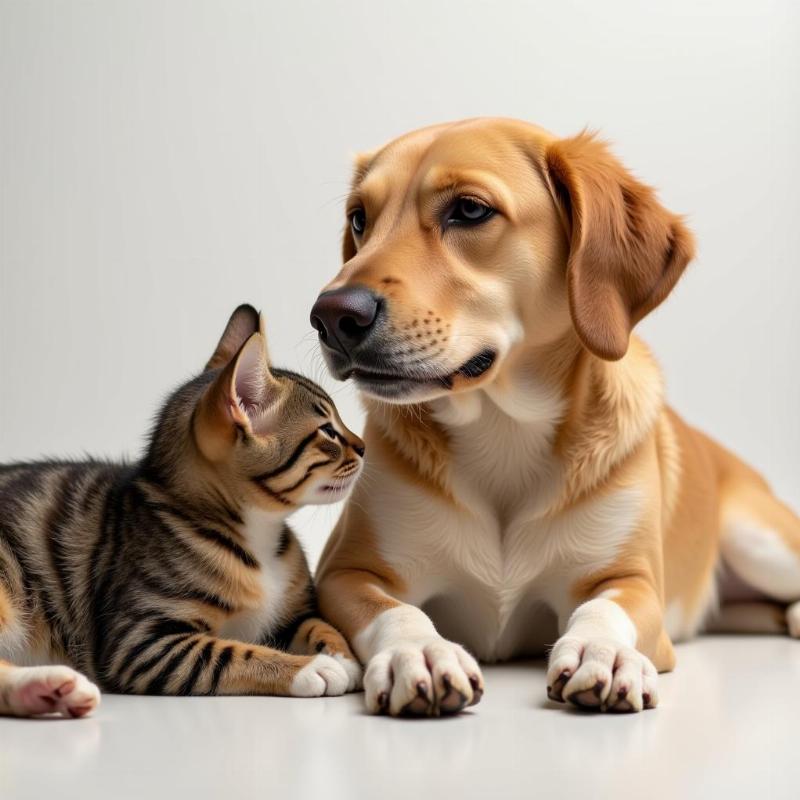Dogs and cats, two of America’s most beloved pets, often seem like polar opposites. Dogs are known for their boisterous enthusiasm and unwavering loyalty, while cats are often depicted as independent and aloof. But beneath these surface differences, what do dogs and cats have in common? Surprisingly, quite a bit! This article dives into the shared traits of these popular companions, exploring their biological similarities, social needs, and capacity for love.
Shared Ancestry and Biological Needs: More Alike Than You Think
Though they occupy different branches of the evolutionary tree, dogs and cats share a common ancestor: the miacid, a small, weasel-like carnivore that roamed the earth millions of years ago. This shared heritage manifests in several key ways. Both are carnivores, requiring a diet rich in animal protein. They both have heightened senses, particularly hearing and smell, though the specifics differ. Additionally, both dogs and cats experience similar basic biological functions, including needing sleep, experiencing a range of emotions, and requiring regular veterinary care. This shared biology forms the foundation for many of their common needs. For example, both benefit from routine vaccinations and preventative treatments for parasites like fleas and ticks, which are common concerns across the US.
The Social Animals: Craving Connection and Comfort
Contrary to the stereotype of the solitary feline, both dogs and cats are social animals, albeit in different ways. Dogs, descended from pack animals, thrive on interaction and often form strong bonds with their human families, demonstrating clear signs of attachment and seeking out human companionship. Cats, though often more independent, also benefit from social interaction, forming close bonds with their owners and even other pets. They express affection through purring, rubbing, and gentle kneading. This social nature highlights the importance of providing both species with adequate mental and physical stimulation. Playing with your dog using toys designed for the American market, or providing your cat with a stimulating environment enriched with climbing structures and interactive toys, caters to these innate needs.  Cats and Dogs Playing Together
Cats and Dogs Playing Together
Communication: Speaking Different Languages with Similar Meanings
While the nuances of their communication differ, both dogs and cats express a range of emotions through vocalizations and body language. A dog’s bark can convey excitement, fear, or territoriality, while a cat’s meow can signify hunger, contentment, or distress. Both species also utilize non-vocal cues, such as tail wags, ear position, and body posture, to communicate their intentions and emotional state. Understanding these signals is crucial for building a strong bond with your pet. For instance, recognizing the signs of stress in your dog, such as excessive panting or lip licking, can help you address their underlying anxieties. Similarly, understanding the subtle signs of illness in your cat, such as changes in appetite or litter box habits, can prompt you to seek timely veterinary intervention.
A Shared Capacity for Love and Companionship
Perhaps the most significant commonality between dogs and cats is their capacity for love and companionship. Both species can form deep and meaningful bonds with their human families, providing unconditional love, emotional support, and a sense of belonging. Whether it’s a dog greeting you enthusiastically at the door or a cat curling up on your lap for a purring session, these shared moments of affection underscore the profound impact these animals have on our lives.
Conclusion
While dogs and cats may express themselves differently and have distinct personalities, they share a surprising number of similarities, from their basic biological needs to their capacity for love and companionship. Understanding these commonalities allows us to provide the best possible care for our furry friends, ensuring they live long, healthy, and fulfilling lives as valued members of our families. By recognizing what do dogs and cats have in common, we deepen our appreciation for the unique and enriching contributions both species make to our lives.
FAQ
- Do dogs and cats need the same vaccinations? No, dogs and cats require different vaccinations based on their species-specific vulnerabilities to certain diseases. Consult with your veterinarian to ensure your pet receives the appropriate vaccinations.
- Can dogs and cats live together peacefully? Yes, with proper introductions and a respectful understanding of their different needs, dogs and cats can often coexist harmoniously, and even develop close bonds.
- Do dogs and cats experience similar emotions? Yes, both dogs and cats experience a wide range of emotions, including joy, fear, anxiety, and grief, although they express these emotions in different ways.
- Do dogs and cats require the same amount of exercise? No, dogs generally require more exercise than cats. The specific exercise needs vary depending on breed, age, and individual health.
- Can dogs and cats eat the same food? No, dogs and cats have different nutritional requirements. Feeding them food specifically formulated for their species is essential for their health and well-being.
- Do dogs and cats understand human language? While they may not understand the specific words we use, dogs and cats can learn to associate certain words and phrases with actions and commands. They also rely heavily on our tone of voice and body language.
- What are some common signs of illness in both dogs and cats? Changes in appetite, lethargy, vomiting, diarrhea, and changes in behavior can all be indicators of illness in both dogs and cats.
Related Articles on Beautdogs.us:
- what do cats and dogs have in common
- good flea spray for dogs
- plants dogs don't like
- do ticks cause heartworms in dogs
Beautdogs.us is your premier resource for all things dog-related in the United States. We offer expert advice on dog breeds, care, and products, catering to both new and experienced dog owners. From finding the perfect breed for your lifestyle to understanding the latest in canine health and nutrition, Beautdogs.us provides trustworthy information and valuable insights to help you navigate the joys and responsibilities of dog ownership. Contact us today for expert guidance: Email: [email protected], Phone: +1 501-555-7529.